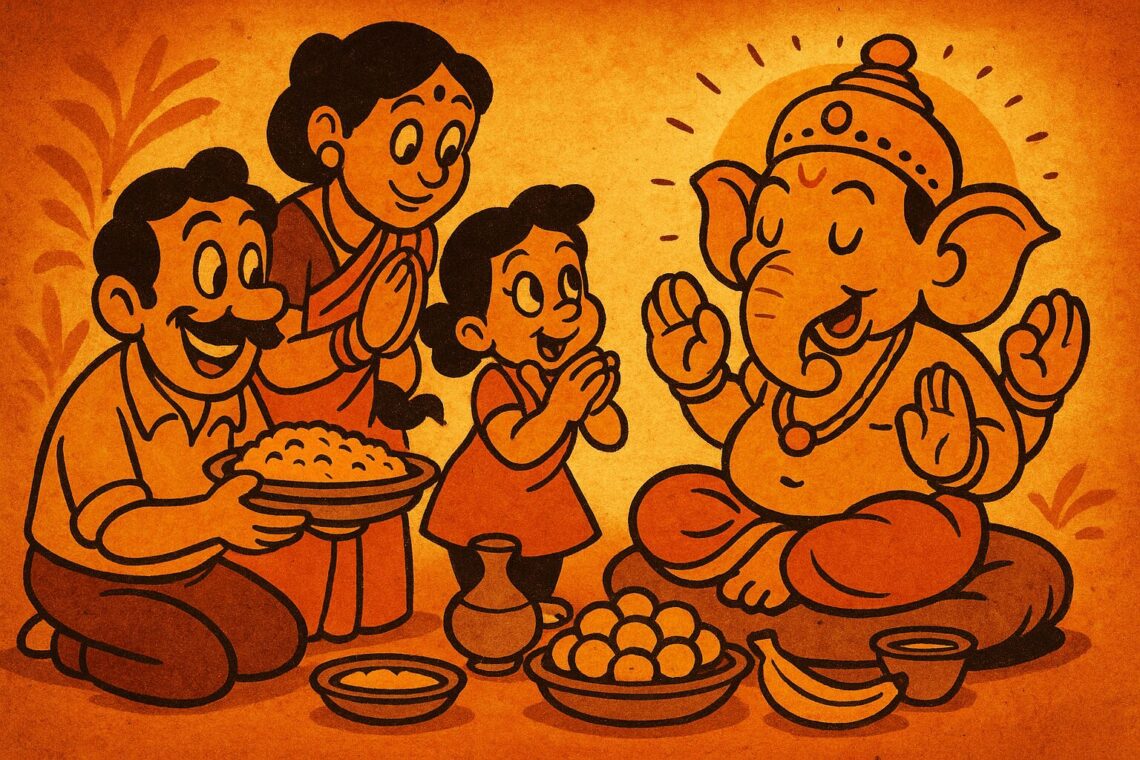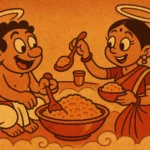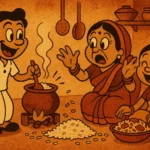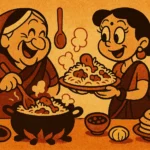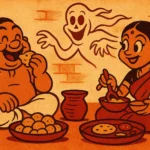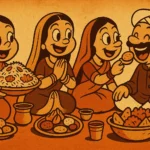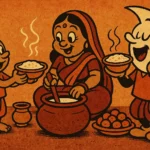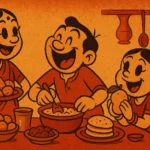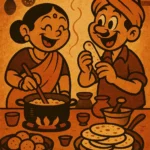As I sit in my Austin kitchen, preparing yet another dinner, I can’t help but think back to the food stories I grew up with in Mumbai. The legends of the gods, the magical offerings, and the divine feasts that always seemed to have one thing in common: food was central. I remember my grandmother telling stories of the gods and their feasts, and how the gods always seemed to eat first—before anything else. This wasn’t just about filling their bellies; it was a statement about power, connection, and grace. In Hindu mythology, food is more than just nourishment; it’s magic, metaphor, and myth, rolled into one. It’s something that can bring us closer to the divine, and often, to each other.
It’s not just the gods who feast, though. The food in these stories is symbolic, layered with meaning, and wrapped in dreams of possibility. Think of the Bollywood biryanis, the sumptuous spreads that show up in films as a mark of opulence and celebration. Or the grandmother’s legends where food is more than just fuel—it’s the currency of love, tradition, and legacy. Food, in these tales, is a thread that ties us all together. And yet, there’s a deeper, more spiritual undertone to the role food plays in these myths. Food is the divine gift, a blessing, something that transcends the mundane and becomes something holy.
The Gods and Their First Course
In Hindu mythology, food often plays the role of a sacred offering, an act of devotion. Whether it’s the fruits offered to Lord Ganesha or the elaborate meals prepared for the great feasts of the gods, the act of offering food is as much about reverence as it is about sustenance. But one thing is clear: the gods always eat first.
This concept goes beyond simple ritual; it signifies the importance of putting the divine before ourselves. Take the story of the churning of the ocean (Samudra Manthan), where the gods and demons churn the ocean of milk to extract the nectar of immortality. The gods, in this instance, are given the first share of the nectar—just as they are the first to receive offerings in rituals. It’s a reminder that food, in the spiritual sense, isn’t just for personal nourishment—it’s an offering to the divine, a way of honoring the higher forces that govern our lives.
What’s interesting here is the idea of “firsts.” The gods don’t just get the first bite—they also set the tone for the rest of us. This is mirrored in our daily lives, where we often begin our meals with a prayer, an offering, or a moment of gratitude. Just like the gods, we take a moment to honor the food, to recognize it as a gift. Whether it’s the symbolic rice offered in temples or the coconut we break at the start of a new endeavor, food is an act of both reverence and joy.
Food as a Metaphor: Bollywood’s Grand Feasts
When I think of food in Indian culture, my mind inevitably drifts to Bollywood. There’s something quintessentially Indian about the extravagant feasts you see in films—those scenes where families come together around large, fragrant platters of biryani, samosas, and curries. These scenes are full of life, laughter, and, of course, a little bit of melodrama. The food on these tables isn’t just food—it’s a metaphor for the abundance of life, for the connections between people, and for the happiness that comes from sharing a meal together.
But these feasts are also often tied to some deeper meaning. In the epic film *Mughal-e-Azam*, there’s a scene where the grand dinner table serves as a symbol of opulence, power, and love. The food becomes a backdrop to the emotional drama playing out in the royal court. Food here doesn’t just fill the stomach; it feeds the soul. And in a similar way, food in mythology, too, plays a role in connecting the divine to the earthly, the heavenly to the human. It’s a bridge that links us to something greater.
The mythological stories often serve as a reminder that food, like love, can transcend boundaries. Whether it’s the lavish feasts of kings or the humble meal of a village family, food becomes the medium through which relationships are formed, nurtured, and remembered. And in Bollywood, where food is often the center of joyous celebrations, it’s clear that food holds power to elevate the spirit and bring people together, much like the meals shared among the gods themselves.
Edible Symbolism: The Deeper Meaning of Food
In Indian culture, food is deeply symbolic. From the very first grain of rice to the last spoonful of dessert, everything we eat carries meaning. Think about the importance of rice in Hindu rituals, where it’s often used as an offering to gods and is central to many religious ceremonies. Rice, in this sense, isn’t just a staple—it’s a sacred food, a food that connects the human to the divine. In the story of Draupadi’s boon, where Lord Krishna saves her from disgrace by magically providing endless food, we see how food becomes the symbol of divine intervention and grace.
The symbolism doesn’t stop at rice. Consider the use of sweets like ladoos or peda in celebrations and rituals. Sweets, in Indian tradition, are not just a treat—they are symbols of joy, prosperity, and blessings. Even in the tales of Lord Ganesha, where laddoos are offered as a symbol of spiritual fulfillment, food is never just about the body; it’s about the soul’s nourishment. This is where food in Hindu mythology transcends the physical and enters the metaphysical realm—food becomes a vessel for the divine, a metaphor for abundance and blessing.
Food in Dreams: A Taste of the Divine
And then there are the dreams. Growing up, I often heard my grandmother talk about the magical food offerings the gods would bestow upon their devotees in dreams. The stories of divine meals, where the taste of the food is said to be sweeter than anything earthly, are prevalent in Hindu mythology. The idea is that food, when touched by the divine, can evoke feelings of transcendence and joy that are beyond description. For me, these stories remain a powerful reminder that food, in its most mystical form, is an experience that can elevate our senses to the divine. It is not just nourishment for the body, but for the soul.
Food, in these stories, isn’t about the mundane act of eating; it’s about connection, transcendence, and the realization that we are all a part of something much larger. The gods eat first, not because they’re hungry, but because they show us the path to fulfillment—not just physically, but spiritually. In a world where food is often reduced to a necessity, these myths remind us that food can be magic, that it can be a metaphor for love, prosperity, and grace.
Food as a Sacred Bridge
From Bollywood biryanis to grandmother legends, food in Indian culture and mythology is never just about eating. It’s about connection—connection to the divine, to our traditions, and to each other. It’s about the magic in the mundane, the way a simple meal can transcend the physical and touch the spiritual. The gods always eat first, not because they need to, but because their meals remind us of something bigger—of our place in the world and the abundance that surrounds us. Food, in its deepest sense, is a sacred offering. It’s not just a meal—it’s a connection to everything we hold dear.
Born in Mumbai, now stir-frying feelings in Texas. Writes about food, memory, and the messy magic in between — mostly to stay hungry, sometimes just to stay sane.

